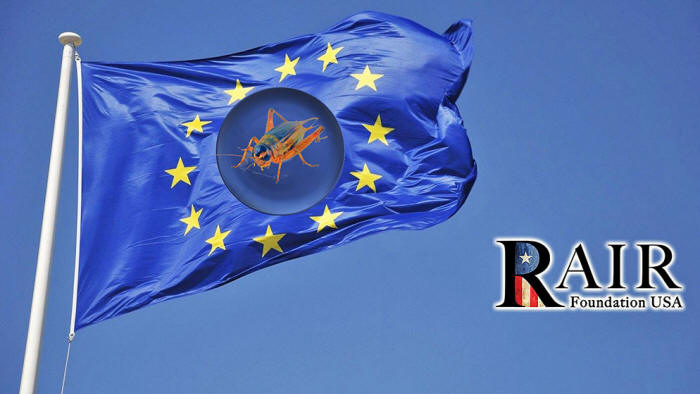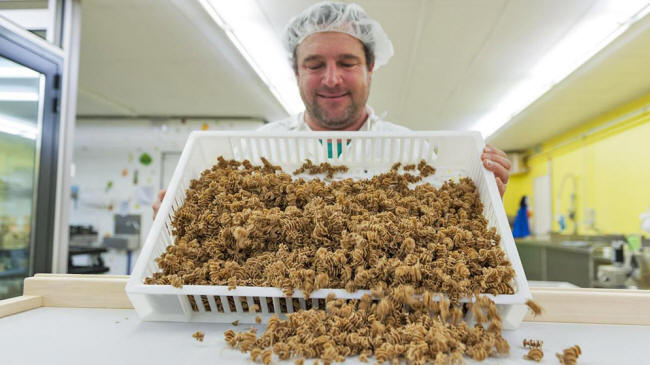|

by Vlad Tepes
March 26,
2023
from
RAIRFoundation Website

Globalists are trying to brainwash citizens
with their
environmental and nutritional propaganda
to control
citizens' food choices...
Hungary has enacted stricter rules against the
clandestine insectification of foods.
The Minister of
Agriculture István Nagy announced on his social media site
that they are now requiring foods containing insect proteins to
carry the label,
"Warning! Food
containing insect proteins",
...and must be displayed
separately from other products,
The minister stressed that the government wants to protect Hungarian
consumers from foods containing insect protein authorized by
Brussels in the European Union (EU) through strict product labeling
and segregation rules.
Hungary was the only member state not to support the EU's intention
to allow insects to be marketed as food and food ingredients in the
EU.
He added that the
European Commission is risking our gastronomic traditions and
eating habits.
That is why the
Ministry of Agriculture has amended the food-labeling regulation
to provide accurate information to consumers.
Products containing
insect proteins will be clearly distinguishable and segregated on
store shelves.
Non-compliant packaging
and labels may continue to be used for three months, and products
with such packaging or labels may remain on the market for a maximum
of three months.
István Nagy also pointed
out that no fines for non-compliance with the amended Regulation for
90 days will be imposed.
He pointed out that representative surveys by the National Food
Chain Safety Office clearly show that since 2016, the proportion of
people in Hungary who will not eat insects has increased by 2.4
percent.
Those who prefer buying food of Hungarian origin do not want to eat
insects.
In addition, he
underlined that Hungarian farmers always provide the Hungarian
population with high-quality foodstuff, fresh and good quality food,
so there is no need to fear either food shortages or protein
shortages.
He also said that the regulation does not affect insect-derived
additives, which have been widely used by the food industry but
apply to insects as ingredients...
Italy bans
insect flour from its pasta
Italy has banned insect flour from its pasta,
reports The Times.
"The growing use in
cooking of flour made from crickets, locusts, and insect larvae
has met fierce opposition in Italy, where the government is to
ban its use in pizza and pasta and segregate it on supermarket
shelves."

A chef makes a special
pasta
with insects flour made with
locusts or crickets
In a sign of fear that insects might be associated with Italian
cuisine, three government ministers called a press conference in
Rome to announce four decrees aimed at a crackdown.
"Fundamentally, these
flours are not confused with food made in Italy," said
agriculture minister Francesco Lollobrigida.
As
previously reported at RAIR Foundation USA, unelected self-anointed globalists have fought
for years for westerners to eat bugs.
They hope to brainwash
citizens with environmental and nutritional narratives in order to
control their food choices...
"Packed with
vitamins, proteins, and minerals, flour made from crickets is
increasingly seen as an ecological way to obtain nutrients, and
the market is forecast to reach $3.5 billion by 2029."
"The EU has already
authorized foods made from crickets, locusts, and the darkling
beetle larva.
In January, mealworm
larvae were added to the list."
However, all four insects
are cited in the Italian decrees, requiring any products containing
them to be labeled with large lettering and displayed separately
from other foods.
"Whoever wants to eat
these products can, but those who don't, and I imagine that will
be most Italians, will be able to choose," Lollobrigida said.
Orazio Schillaci,
the health minister, said,
the legislation would also ban the use of
insect flours in "typical" Italian products like pizza and pasta.
In a further attempt to promote Italian food, the government
announced on Thursday that it would propose the inclusion of Italy's
cuisine on Unesco's world heritage list.
References
|



